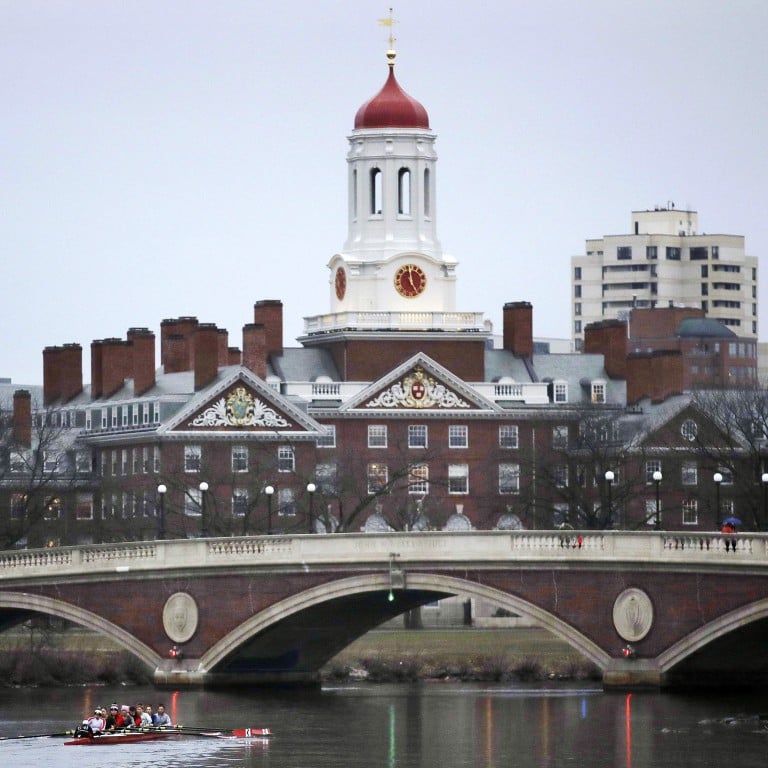
Harvard not discriminating against Asian-Americans, US appeal court rules
- Decision means university can continue to consider race in its admissions criteria, among other factors for selecting a diverse cohort
- Plaintiffs, an anti-affirmative action group, vow to take the case to the US Supreme Court
Harvard University can continue to use race in its admissions criteria after a federal appellate court ruled that diversity within its student body aligns with the school’s mission and that the selection procedures do not discriminate against Asian-Americans.
“The issue before us is whether Harvard‘s limited use of race in its admissions process in order to achieve diversity in the period in question is consistent with the requirements of Supreme Court precedent. There was no error,” the US Court of Appeals in Boston said in a decision released on Thursday.
“Race is one piece of Harvard‘s interest in diversity. It is considered as part of a ‘broader effort to achieve exposure to widely diverse people, cultures, ideas, and viewpoints’,” it said, referencing a 2015 report issued by Harvard College dean Rakesh Khurana.
Race is sometimes taken into account by Harvard’s admissions officers as part of each applicant’s “personal ratings”, one of six rating categories assigned during the initial assessment stage.

03:37
‘Anti-blackness is something deeply rooted in my community,’ says student Eileen Huang
Students for Fair Admissions (SFFA), the anti-affirmative action group that initiated the lawsuit against Harvard, said the race factor benefits African-American and Hispanic applicants and discriminates against Asian-Americans.
The court said Harvard had a “compelling interest” in considering race to create a diverse class and that its admissions programme was “narrowly tailored” enough, to achieve its goal lawfully.
The ruling was a rebuke to SFFA, which lost its initial case a year ago and brought the case to the appeals court, and also to the administration of US President Donald Trump, which filed an amicus brief on behalf of SFFA shortly after the group lost its case in the lower court.
SFFA President Edward Blum, said his group plans to appeal the case to America’s highest court.
US sues Yale over discrimination against Asian-American and white applicants
“While we are disappointed with the opinion of the First Circuit Court of Appeals, our hope is not lost,” Blum said. The lawsuit, which was initiated six years ago “is now on track to go up to the US Supreme Court, where we will ask the justices to end these unfair and unconstitutional race-based admissions policies at Harvard and all colleges and universities”.
“As SFFA revealed in the Harvard trial, eliminating legacy preferences, preferences for the children of faculty and staff and preferences for the children of wealthy donors while giving a greater weight to students from economically disadvantaged backgrounds will produce an individualized and diverse student body without treating students differently by race.”
Blum was alluding to findings in the case that “recruited athletes, legacy applicants, applicants on the Dean’s Interest List, and children of faculty or staff” – a group known to admission officers as ALDCs – make up less than 5 per cent of applicants to Harvard but around 30 per cent of the applicants admitted each year.
The SFFA would need to show the Supreme Court that Asian-Americans have suffered disproportionately in the way that Harvard brings race into its admissions equation.

Part of the appeal court’s 104-page ruling on Thursday noted that, from 1980 to 2019, the share of Asian Americans admitted to Harvard relative to their applications “co-varies almost perfectly”, making it difficult to argue that the use of race as one metric among many in Harvard’s admissions criteria has blocked applicants on this point.
“The fact that Harvard‘s admitted share of applicants by race varies relatively little in absolute terms for the classes of 2009 to 2018 is unsurprising and reflects the fact that the racial makeup of Harvard’s applicant pool also varies very little over this period,” the ruling said.
“The district court properly concluded that Harvard does not utilize quotas and does not engage in racial balancing”, a practice that SFFA claimed is part of the school’s admissions process, to the detriment of Asian-Americans.
Even if SFFA’s case against Harvard does not make it to the Supreme Court, the group is pursuing the issue in other cases.
The University of North Carolina and the University of Texas are fighting similar challenges by the group, and President Donald Trump’s Justice Department has sued Yale University over its consideration of race.

